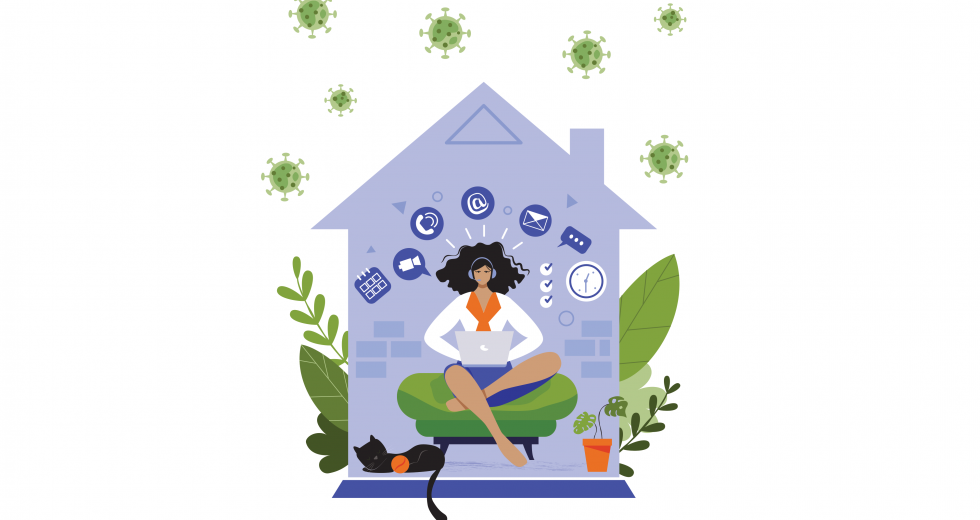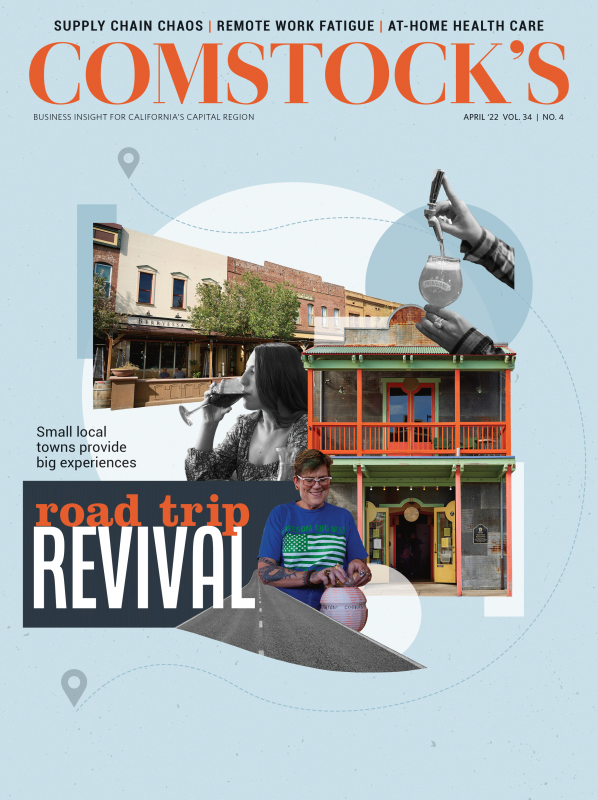There was a time, not long ago, when many of us thought the workplace would return to normal by the summer of 2021. Then came the delta variant, then omicron and we were all part of something that was once unthinkable — a two-year pandemic that forced lockdowns and businesses to send their workers home for their health and safety. And now we’re in year three.
Remote work has not disappeared. What began as an emergency experiment for many at the onset of lockdowns due to COVID-19 will continue indefinitely and perhaps forever. We have now reached the two-year anniversary of remote work, and that’s taking a toll on our collective mental health.
“Folks are burned out,” says Dr. Corrine McIntosh Sako, president of the Sacramento Valley Psychological Association. She says the burnout is coming from “chronic, cumulative trauma. When we think of trauma, we think of one catastrophic event. But trauma can also be prolonged suffering, with no end in sight. Telework is one aspect of that cumulative stress.”
“Folks are burned out. … When we think of trauma, we think of one catastrophic event. But trauma can also be prolonged suffering, with no end in sight. Telework is one aspect of that cumulative stress.”
Dr. Corrine Sako, President, Sacramento Valley Psychological Association
This squares with a survey of 1,320 therapists by The New York Times and Psychology Today in December 2021 that found “nine out of 10 therapists say the number of clients seeking care is on the rise.” This is also true locally. Every Capital Region-area therapist interviewed for this story agreed we are in a mental health crisis, and the demand for therapy has surged. “I have never been more busy in my practice in 20-plus years,” says Dr. Daniel Rockers, a local therapist and former president of the California Psychological Association.
So how, specifically, is remote work affecting us?
We’ll start with the obvious. Zoom fatigue is real, says Sako, adding she’s seen it cause “so many physical complications,” from headaches to shoulder pain to back problems. That has a spillover effect. “When people are hurting from physical pain,” says Sako, “that will make them less tolerant of emotional distress.”
Then there’s a sneakier psychological toll. Dr. Caryn Banqué, a psychologist with downtown Sacramento offices, says there are two simultaneous factors that pose a problem on Zoom: Because people are working from home, they’re not taking as much care of their attire or appearance; and on the Zoom screen, they constantly stare at that little picture of themselves in the window, giving them an unusually high amount of mirror time. So as Banqué describes the paradox: “We might get more hyper-focused with how (we) look, even though we’re not taking care with how we look.”
We’re social creatures. And remote work tends to reduce something called “emotional resonance,” says Dr. Brandy Engler, founder and CEO of Silver Lake Psychology. When we’re around our coworkers in the office, says Engler, thanks to all the tiny moments of chitchat and smiles and eye contact, we get little bursts of dopamine and oxytocin to the brain. “You’re not quite getting that on Zoom,” Engler says.
Our brains are wired to pick up on the emotions of others around us, so when one coworker is super cheery, everyone else feels better. This is emotional resonance. “Our bodies and brains have the ability to read other people’s emotions,” she explains. “It’s a survival function.” As emotional resonance teaches us empathy, it lets us pick up on social cues, and it helps us make smarter social decisions. Sometimes, of course, emotional resonance can work to our detriment — the grumpy accountant two cubicles over who might be a killjoy. On balance though, Engler says “we’re not getting emotional resonance by being cooped up alone.”
Banqué agrees and calls this dynamic the “group effect.” She notes while we tend to think of the mob mentality as a negative, groups can uplift us. Whether it’s a brainstorming session, a team lunch or even a ho-hum staff meeting, “when you’re working in a group, you get so much more excited about things.” This collective experience is tough to replicate online. As Banqué says, “When you’re sitting at home alone trying to figure it out, there just isn’t as much enthusiasm.”
Another common problem is the loss of transitions. When we commute into an office, says Banqué, “that gives our brains time to switch gears, and we don’t have that right now.” Banqué notes in Sacramento especially, many had the habit of biking into the office, which served as a mental refresh. Now that transition is gone. So are the overlooked transitions of grabbing a coffee from down the block, having lunch with a colleague or even huffing up a few flights of stairs from your desk to the conference room. The benefits from the proverbial water cooler talk are real.
This loss of transitions is similar to a problem that Sako frequently sees with her patients. “Most people are having a hard time separating work and life,” she says. Someone might be working on a laptop, eating pasta, folding laundry and binge-watching “Love Is Blind” all on the same couch. This is why Sako talks about setting boundaries with “almost every client and every session.” Not just emotional boundaries (the usual connotation in therapy) but actual boundaries between work and leisure time, boundaries around when you go to bed, even boundaries around when you take a shower and put on clothes.
A heavy dose of remote work, as likely every married person knows, can put new stressors on relationships and families. When partners both work from home, “people are more temperamental, they’re easily triggered and they have no outlet to retreat to,” says Dr. Arrickia McDaniel, the clinical director at STRIVE Community Health, which doubled its staff in the past two years and still struggles to meet demand. Engler, who does extensive couples therapy, says remote work tends to intensify any preexisting tensions and issues. She says she has seen “an increase in fighting, bickering and clients talking about wanting to get a divorce.” More people are reaching out to Banqué for couples’ counseling. “Usually January is a lull, but this year it was a spike,” says Banqué, but unfortunately not everyone is getting help, as the demand for therapy is so high and “everybody is so booked up.”
Of course, not everyone is hurt by remote work and many still see it as a gift. No commute. No constant interruptions. Banqué has found that younger people (those in their 20s) have generally coped better than older people, as “they were already online.” Rockers found the same thing for people working in information technology, as “they were already used to working remote.” Introverts generally had an easier time for obvious reasons, but as Banqué says, over time, even the introverts were ”starting to go nuts.”
Dr. Alex Andrade Jr. is another local therapist. For his patients, the workers handling Zoom life the best are the ones who have strong routines and structure. On the flip side, other patients “wake up five minutes before they log in,” and that ends up “bleeding into unhealthy habits.” Similarly, Banqué found people with attention deficit hyperactivity disorder have had an especially tough time with remote work, as “they don’t have the same kind of structure, and it can be so much harder for them to focus on their work and be productive.” Often they get lost during the day and their work oozes into the night, and they can “end up taking 60 hours to do what they were able to do in 20.”
Remote work isn’t happening in a vacuum. The pangs of Zoom life add to the cocktail of anxiety most of us are facing — stress over political polarization, inflation, job insecurity, the health of loved ones, COVID-19 and its regulations, school openings and closings, and even the possible looming threat of World War III. It’s a lot. (Especially for parents and most especially for working moms.) The way Andrade sees it, remote work is a “huge contributor” to the mental health crisis, as it “compounds issues people already have.”
The sum total of these issues is why when Sako asks her patients, “How are you doing?” the answer she hears most often is “they’re doing.” Not thriving, not excelling, but just “maintaining, and they’re barely keeping their nose above the water.” (Caveat: Obviously this is a self-selecting group, as those who seek therapy went there for a reason. Yet the therapists are comparing what they’re seeing to a pre-pandemic baseline, and they’re saying things are getting worse.) Many feel anxiety. Depression is common. Sako says for people who had mental health challenges before the pandemic and then largely recovered, ”the pandemic knocked them off that stability.” They’re more likely to return to addictions. Engler says Silver Lake Psychology has nearly doubled its normal volume (12,000 total visits in January 2022 compared to 6,600 visits in January 2021), and more tragically, has already experienced multiple patient suicides this year, which “is unusual for a group practice that largely serves high-functioning clients, generally the ‘worried well.’”
So for those of us burned out from two years (and counting) of remote work, what can we do to improve our mental health? The most obvious answer is to seek therapy or guidance from a mental health professional. Many people don’t do this because of the cost, stigma or inconvenience, but as Andrade points out, with the rise of remote teletherapy, it’s now easy to do so in the privacy of your home. He adds it’s worth double checking your health insurance, as more plans have seen insurance benefits increase or become more accessible.
Here are some specific, concrete steps from the experts:
Get microsocial
“Go to Starbucks and get your coffee,” Engler says. “Or if you’re in Midtown Sacramento, patronize a local coffee shop. Smile and connect. Feel like you’re amongst other humans.” These little pockets of humanity add up, says Engler, and they help “increase your social therapy.”
“Go to Starbucks and get your coffee. Or … patronize a local coffee shop. Smile and connect. … These little pockets of humanity add up, and they help ‘increase your social therapy.’
Dr. Brandy Engler, founder and CEO of Silver Lake Psychology.
Build in transitions
Andrade recommends creating transition rituals for moments like starting your workday, ending it and going on a lunch break. They can be simple. The rituals could be a walk around the block, a short bike ride or maybe just putting on your “work sweater” while you’re sitting at your desk, and then taking it off at the end of the day. (It worked for Mr. Rogers.)
Go easy on yourself
“People should not expect themselves to function or feel how they did prior to the pandemic,” Sako says. It’s valid to feel bummed or anxious, and punishing ourselves only makes things worse. People feeling burned out from remote work should know everything they’re feeling is valid, Sako says. She advises people to cut themselves some slack, consider what they are getting done and even give “praise for the things they are accomplishing.”
Give your body some love
Sako says we shouldn’t overlook the basics: sleep, exercise, healthy food and no more than a moderate intake of alcohol. “Get in a car and go somewhere,” McDaniel says, who rightly notes that “we’re surrounded by lakes and rivers and mountains.” When we’re feeling depleted or adrift, McDaniel says, a trip to nature can ground us to the here and now.
Embrace social hobbies
In the pre-vaccine days of COVID-19, Andrade resolved he would start playing pool as soon as it became safe to do so; that helped him become more social even as much of his work (via teletherapy) remained remote. He also launched a podcast, “Psychology Plus,” which gave him a creative outlet, as “this was my own way to take care of myself.”
Help yourself by helping others
Altruistic, volunteer-based projects can be nourishing, McDaniel says, “especially if you’re feeling isolated.”
Do something social outdoors
If you’re an executive who moved your team remote — and kept it that way — Engler says now, after all this time, it’s even more important to do something in person together, like an outdoor picnic in the park. “I think that’s better than the cliche happy hour Zoom.”
Let yourself play
“What’s missing so much in today’s society,” Rockers says, “is to have some fun creative outlets and play.” That could take as little as five minutes. Maybe it’s drawing, maybe it’s playing the guitar, maybe it’s simply listening to a song you love — really listening — while doing nothing else. As Rockers reminds us, after two years of trudging through the pandemic, “We’re doing so much and it’s OK to take some time to not do.”
–
Stay up to date on business in the Capital Region: Subscribe to the Comstock’s newsletter today.
Recommended For You
Sponsored

Transforming Environments of Health
HGA
HGA, an interdisciplinary design firm with offices nationwide, provides architectural design and all disciplines of engineering. In Sacramento and throughout Northern California, the firm offers architecture, structural engineering, mechanical engineering, plumbing engineering and interior design.
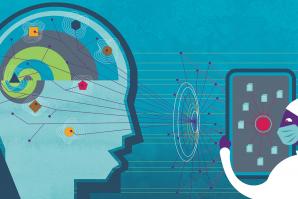
Can Artificial Intelligence Improve Mental Health?
After the disruption of 2020, the push for more collaborative affiliations has become even more urgent. At the core of this evolving model is technology.

The Essential Work of Women
Women in the workforce juggled careers, families and health concerns amid the pandemic — and found silver linings
As many women faced changes in their jobs during the past two
years of the pandemic, they were able to shift the priorities and
persist with the support of their families, colleagues and
communities.
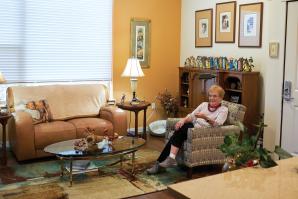
The New Age of Aging
Developers in the Capital Region are building new models of senior housing — in preparation for the ‘silver tsunami’ to come
As aging baby boomers approach their golden years, new senior living projects are springing up to accommodate to increased demand and offering a new take on “aging with grace.”
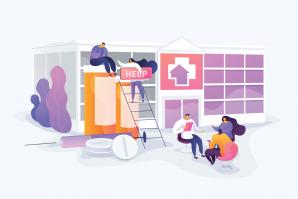
Coping With COVID
As stress levels have soared, treatment programs for substance use battle to keep up
The challenge for treatment programs can be broken down into four
parts: lack of workforce, limited capacity, timing conflicts and
insurance issues.
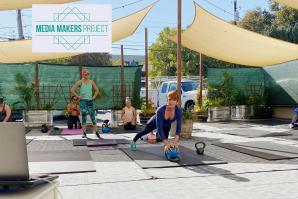
Go Outside to Survive
How some businesses in the Capital Region have adapted to operate outdoors in order to stay open
Moving services outside has been a lifesaver for some businesses that would have otherwise had to shut down.

How to Get Past the Coronavirus Crisis Without Losing Your Mental Health
With the coronavirus, things can feel overwhelming. But there are ways to care for your mental health, outside resources and small tweaks that can help. We asked experts for guidance to get through this challenging time.



